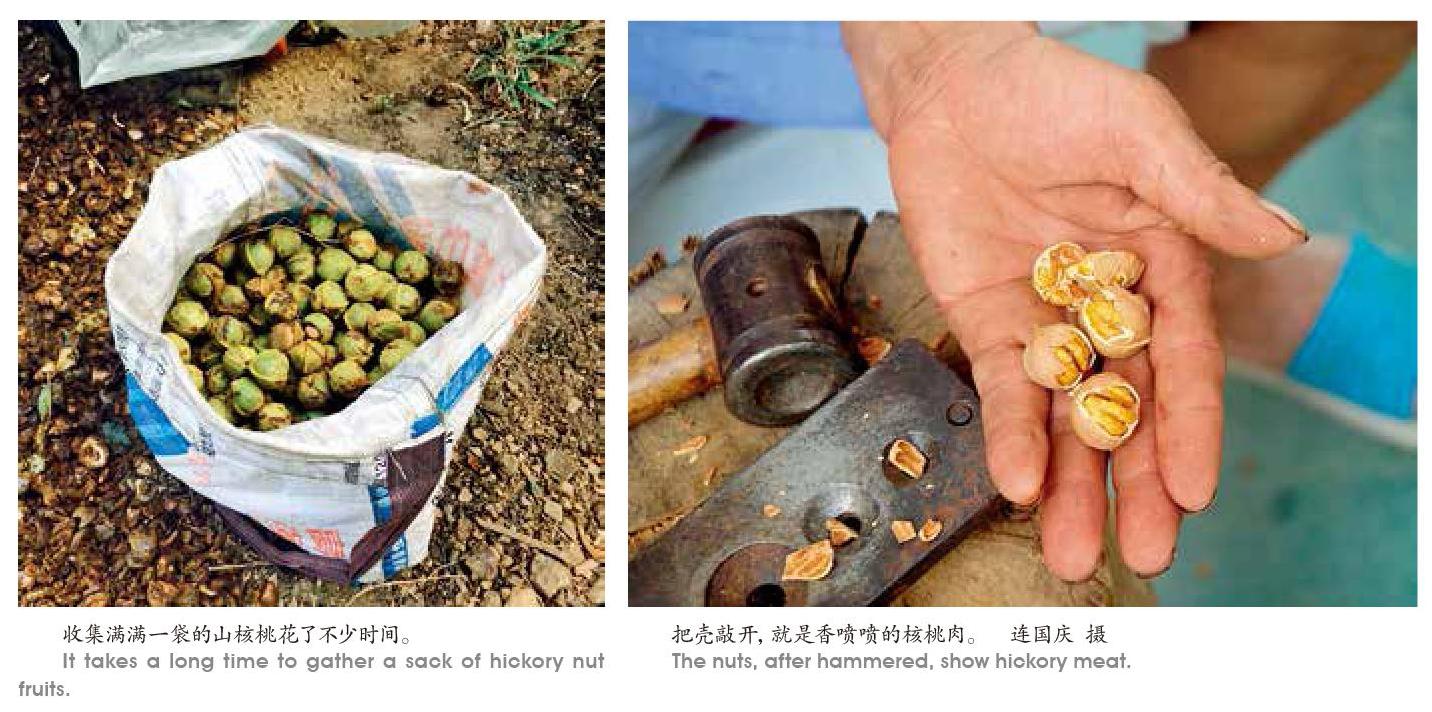竿起白露核桃香
俞天立

打山核桃,绝非易事。先用竿子中上部在树枝上轻轻一拍,利用竿头反弹的冲击力击打在果子上,这样既省力,也能最大程度减轻对树木的伤害,同时增加打落的山核桃的数量。这种科学的打竿方式,体现了对于自然的尊重,蕴含着农人的智慧。
白露到,溽热散.天气渐凉,正是浙江临安山核桃成熟之时。
山核桃的风味,以临安昌化的为最。这种坚果几乎和昌化紧紧地捆绑在一起,与这里盛产的鸡血石一样,让世人对这个浙西小镇的认知变得独特而容易。
(一)
昌化山核桃粒圆壳薄、脆口生津,自明朝初年以来开始种植、榨油,据说一度还成为朱元璋起兵反元时的军粮。清朝黄景仁《核桃园夜起》曾云:“梦回小驿一灯红,四面腥吹草木风。身似乱山穷塞长,月明挥泪角山中。”
近年来,借助于互联网平台,这种珍果声名远播,风靡全国乃至海外,成为吃货们餐余饭后、休闲居家的首选零食之一。
岳父一家都是土生土长的临安昌化农人,世代都与山核桃树的根系紧密连结、难解难分。在他们所在的村庄,家家户户种植核桃树,作为维持生计的重要收入来源。
山核桃这种干果如同娇羞的大姑娘,平素躲在崇山峻岭之中轻易不肯示人,非要等到秋高气爽时节,让人爬到那岧岧的山上高高的树上一竿一竿地打下来,才露出芳容。可见,打山核桃,绝非易事。
凌晨五点,我们一行五人便早起上山了。晨光熹微,山风凉爽。曲曲弯弯的山路,像是农人的汗印。一行人背竿的背竿,驮干粮的驮干粮,吭哧吭哧,寻途登觇,约莫四十分钟才爬到山核桃林。
岳父母家的核桃林位于一面斜坡上,我的视野差不多得扭曲成四十五度角方能仰视那些绿荫浓密的乔木。岳父提了竿子,蹭蹭地爬到树上,身影霎时隐入茂密的树荫里,只剩沙沙的响动。
“啪!啪!啪!——”那竿子击鼓一样敲击在枝干上,又灵巧而准确地回落在枝桠上,极富节奏感的击打声在群山间回荡,如同一首悦耳的协奏曲。谁说农人不懂艺术的美?竿子和树枝跳着欢快的“交谊舞”,成片的山核桃应声而落,如同急雨落入水潭般洒在山坡上。妻子连忙让我把草帽戴好,说万一被山核桃砸到可不是好玩的。
父亲挽起袖子跃跃欲试,岳父笑着让他拿过竿子,站在树下打那些低矮的枝条。只见他猴子一样上蹿下跳,抡起竿子就往树上胡乱地拍打:“啪!啪!啪!”只是这声音是他自己配的,只闻其声,没见几颗核桃落下;一会他又喊“老爸在练武功嘞——”那个滑稽样把众人都逗得捧腹不已。
“你那姿势不对!”岳父憨笑着朝他扯嗓子喊。众人的目光聚焦到了岳父的身上,他开始边比划边传授秘笈。他说,正确的姿势,应是先用竿子中上部在樹枝上轻轻一拍,利用竿头反弹的冲击力击打在果子上,这样既省力,也能最大程度减轻对树木的伤害,同时增加打落的山核桃的数量,可谓一石三鸟。在顺序上,得把近处低处打完再打远处高处,切记不可伤害嫩枝嫩叶。父亲连连点头,虚心承认打山核桃这活计还是很有门道的。
我也由此开悟,山核桃树是自然的生灵、草木的菁华,这种科学的打竿方式,体现了对自然的尊重,蕴含着农人的智慧。
(二)
岳母、妻子和我,就只能干些技术含量较低的活了——负责捡拾打下来的山核桃。
打落的山核桃不少隐匿在残枝、落叶和乱石中,天青色的外壳也与草坡整体颜色接近,发现它们考验着人的眼力。
一开始,我徒手去捡,不料很快手就被染黑,据说要一周左右才能完全洗净。我只好乖乖地戴上了手套。山核桃本是大地之子,吸纳天地之精华、山川之灵秀,对外来的打扰是极其敏感的。当我将其中一颗握在手心,它还带着山林的温度,显得畏葸、娇羞。我把山核桃放到随身的编织袋里,它开始了脱离母树后的长眠。一颗,又一颗……空荡荡的袋子渐渐鼓囊起来,这些刚才还在树枝上摇曳生姿的小生灵,此刻显得极为安详。
漫山遍野的山核桃,仿佛是沙滩上的沙砾,岳父一把打下来的数量,便够我们捡的了。终于,又捡了整整一袋,有惊无险地将之汇总到大麻袋里。岳母说,她干一天,这样的大麻袋要捡上八袋,五百多斤!两周的透支劳作,只为赚得一年的口粮。
午饭自然是在山上解决的。岳父母早已准备了饭菜,放在铁罐里。岳父下了树,把竿子扔在一旁,在地上搭起个简易的灶坑,拾来柴禾,点起一堆灶火。炊烟随风拂过漫山的核桃林,染了种特殊的清香,类似樟木的味道。
“或许,可以试着利用核桃壳,制成香料呢!”父亲脑洞大开。没有人能够回答他的问题,对于岳父母这样的农人来说,伺候好一亩三分地的山核桃已非易事。事后请教了专业朋友,才知核桃青壳可以配制兰花植料,防止土壤板结,亦可驱虫。
此刻,岳父已端上了热腾腾的饭菜。众人席地围坐,狼吞虎咽。劳作后的片刻憩息,竟如此宝贵,仿佛饭菜也美味许多。聪明的岳父见我睡意矇眬,便用纱网为我做了垫子,我聊以枕着树枝小睡一会。秋阳照着我的身子,酥暖暖的。
下午的活儿明显加快,因那大块的区域已捡拾完毕。妻子告诉我说,岳母再负责最后检查一遍便可以收工了。
众人渐渐从各自的岗位上凑拢过来,将一袋袋山核桃汇集在一起,整整有九大袋。那些山核桃相互依偎,仿佛熟睡的婴孩,芳馨的香气萦绕鼻尖。经过农人带温度的手,小小的山核桃变得温润可爱。
岳母则继续一路捡拾,她的脊背弯成一轮弯月,仿佛是向大地的鞠躬,表达着深深的敬意和谢意。毕了,她双手合十,对着那棵高大的核桃树王,虔诚地作了个揖。“落其实者思其树,饮其流者怀其源”,这样的道理,岳母说不出来,但是她懂。对天地山泽心存敬畏,它们才会平等地回馈人类。法天则地,是亘古不变的真理。
(三)
我们在山上的最后一道工序,便是为山核桃进行脱壳。脱脯机就在山上,是岳父一早用“爬山虎”()运来的。将满袋的山核桃倒进喇叭口里,脱脯机便隆隆地运作起来。
机械怪兽开始吞噬这些生灵,精准地划清自然与世俗的界限。从出口吐出来的脱了壳的山核桃,便是我们平时看到的模样了;而那些青壳,从另一侧的口子汹涌而出。
岳父讓我拿了锄头,将青壳从机器下方扒离,这些山核桃的“青色外套”很快变成了咖啡色。这种神奇的改变兆示着生命的演化,标志着山核桃离开大自然的襁褓,以社会产物的身份继续生存。
汗涔涔的岳父将三满袋去壳山核桃装上“爬山虎”,领着我们踏上归途。推车下山的路尽管崎岖难行,但丰收的欢愉挂在他的脸上,他的双腿噔噔噔走得格外稳健、格外有劲。夕阳在山脊上一点点收起光焰,但我们却越走心里越敞亮。
回到家,天已擦黑。经过岳父的过水筛选,撇去浮在水面的坏籽,那三大袋山核桃竟只剩下三小筐。五个人一整天的劳作成果,不过是三两吃货一日之食。
过水筛选的山核桃籽料,还需要经过晾晒、选料、蒸煮、脱湿、开缝、分筛、烘干、入味等多道工序,才能最终出现在市场上,成为美味的零食。这其中所耗人力之艰,不知凡几。
“谁知盘中果,粒粒皆辛苦。山核桃价格这么贵,不是没有道理,也是对劳动的尊重啊!”妻子感慨道。近年来,随着病虫害增多、土地板结,临安山核桃林逐渐萎缩,山核桃产量早已不比当年。
随着年轻世代走出农村,老一辈农人逐渐衰老,新的山核桃林已逐渐乏人种植。有几人愿意接续这份辛苦的农活?我不免为之心忧。
但至少,对自然的虔敬,应当成为我们永不背弃的生态信仰。保持敬畏、心怀诚明,人生才能如一颗颗圆润的山核桃,释放出美妙的香味。
My wifes parents are rural residents in Changhua, which is famed for a center of hickory nuts production and for bloodstone, a kind of gem often carved into sculptures or made into seals.
In early September last year, my wife and I, her parents and my father got up at five oclock in the morning, ready to take in the hickory nuts from hickory trees in the hilly land allotted for private use. We followed a trail into the mountain carrying long bamboo poles and lunch. We planned to work for long hours. It took us about 40 minutes to climb all the way up to the hickory woods owned by my wifes family.
The hickory trees towered on a steep slope, which I thought was about 45 degrees. I raised my head hard to look up and saw the thick shape of the trees. My father-in-law clambered nimbly up a tree carrying a bamboo pole. Pretty soon I couldnt see him. I only heard the sound of the pole he was using to strike branches and nuts in a light rhythm. His use of the pole was masterful. Who says a rural farmer knows nothing about aesthetics? Pretty soon, hickory fruits rained down. My wife urged me to put on the straw hat. It wouldnt be fun to be hit by the falling fruits.
My father was eager to try his hand. My father-in-law asked him to strike lower tree branches so that he didnt need to climb up a tree. My father jumped up and down excitedly, waving the pole hectically and imitating the rhythmic sound which didnt come from the striking. Few nuts fell for his effort. We all laughed. He joked that he was practicing Wushu.
“Your move isnt right,” my father shouted from up the tree. We looked up at him. He began to demonstrate the method and we watched closely. He hit a branch with the middle part of the pole first and using the recoil of the pole, he stroke target nuts with the tip of the pole. He explained this method minimized any possible damage to the tree and maximized the number of nuts. He went on to explain the strategy he was using: he stayed safe at one spot and targeted the nuts close before he moved on to handle nuts a little bit far away. He said it was important to protect leaves and twigs from any damage in the process of nut harvesting. It occurred to me that this method represents the wisdom of rural life.
So my mother-in-law, my wife and I were left to do the low-tech work: we gathered the fallen fruits. Though it didnt require any special skill to pick, it did need a sharp eye to see where all these fruits were. After all, some fruits looked green in a color similar to the color of grass. At first I picked hickory fruits with bare hands. But pretty soon my hands were dyed black. After learning that the dye would stick to my hand for a week, I changed my mind and put on a pair of gloves. We gathered the fruits into large sacks. My mother-in-law said she gathered eight sacks of fruits a day, that is, about 250 kilograms in total. For the woods of this size, the family needs to work two weeks to gather all the fruits. The cash earned is good enough for the whole year.
Lunch must be had in the mountain. My wifes parents had prepared the food. The father-in-law got down a tree and set up a simple fire pit. Dry wood was gathered and a fire was lit. The food was heated. Smoke rose and went through the hickory woods. The smell of the dry wood was nice.
After lunch, I took a nap in warm sunshine. We worked faster in the afternoon. We covered the whole area. After my mother-in-law checked the whole area again, we gathered together. Altogether, we had nine sacks packed full. My mother-in-law put her hands together and bowed to the tallest hickory tree. After that brief ceremony, we began to get down.
The last task we performed in the afternoon was to husk the harvest through a husking machine, which my father-in-law had carried to a convenient spot with an electric cart in the morning. The electric husking machine roared like a monster. The fruits we had gathered in the mountain were fed into the funnel of the machine. Nuts came out through one hole and the green husks came out through another hole. I used a hole to remove the husks away from the outlet. The green color soon became brown.
The father-in-law put three sacks of husked nuts onto the cart and we followed the trial down the mountain.
It was already dark when we reached home. The father-in-law performed the last task of the day: the husked nuts were put into water. Bad ones were picked out. Good nuts remained. The days work ended up in three baskets.
A multi-step processing will start after these nuts are dried and before they appear onto the market.

